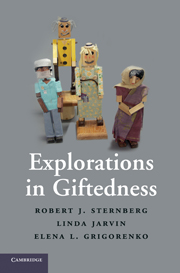Book contents
- Frontmatter
- Contents
- Preface
- 1 What Is Giftedness?
- 2 Theories of Giftedness
- 3 WICS as a Model of Giftedness
- 4 Intelligence and Giftedness
- 5 Creativity and Giftedness
- 6 Wisdom and Giftedness
- 7 Giftedness as Developing Expertise
- 8 Giftedness and Culture
- 9 Learning Disabilities, Giftedness, and Gifted/LD
- 10 Identifying the Gifted
- 11 Educating the Gifted
- References
- Index
7 - Giftedness as Developing Expertise
Published online by Cambridge University Press: 05 June 2012
- Frontmatter
- Contents
- Preface
- 1 What Is Giftedness?
- 2 Theories of Giftedness
- 3 WICS as a Model of Giftedness
- 4 Intelligence and Giftedness
- 5 Creativity and Giftedness
- 6 Wisdom and Giftedness
- 7 Giftedness as Developing Expertise
- 8 Giftedness and Culture
- 9 Learning Disabilities, Giftedness, and Gifted/LD
- 10 Identifying the Gifted
- 11 Educating the Gifted
- References
- Index
Summary
There are two basic kinds of views of abilities and how they contribute to giftedness (see Heller, Monks, Sternberg, & Subotnik, 2000). One view is that giftedness is some relatively stable attribute of individuals that develops as an interaction between heredity and environment. This idea is based on conventional views of abilities (e.g., Guilford, 1967; Spearman, 1927; Thurstone, 1938), which see intelligence as a relatively static entity. Even modern theories often take this position, whether they suggest one kind of ability or many kinds (e.g., Carroll, 1993; Ceci, 1996; Gallagher & Courtright, 1986; Gardner, 2000; Jensen, 1998; Reis & Renzulli, in press; Renzulli, 1978; 1986; Sternberg, 1985a; see essays in Sternberg & Davidson, 1986). An alternative view is that giftedness is to be found within a zone of proximal development – that it can advance from abilities that are ready to be developed to those that are developed (Feuerstein, 1979; Vygotsky, 1978; see also Kanevsky, 1992; Morelock, 2000, for descriptions of how this view applies to giftedness, and Grigorenko & Sternberg, 1998; Lidz, 1987, 1991, for discussions of issues of assessment).
The argument of this chapter is that a particular construct, developing expertise, can integrate these two views of giftedness – one static, the other dynamic. This view is based on that of Sternberg (1998a, 1999a), according to which abilities can be viewed as forms of developing expertise. Ackerman (in press) has pointed out that in one sense, an advantage of intelligence is that it enables people to acquire expertise.
Information
- Type
- Chapter
- Information
- Explorations in Giftedness , pp. 131 - 143Publisher: Cambridge University PressPrint publication year: 2010
